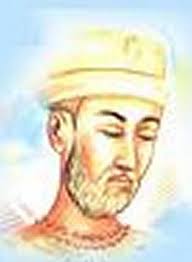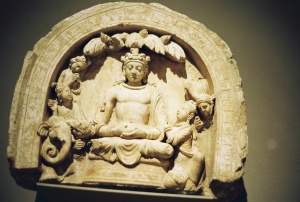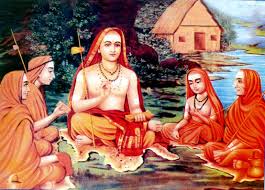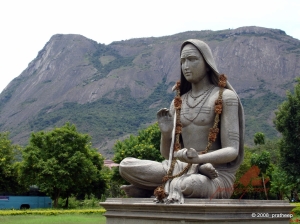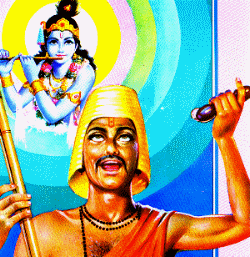
Tulsidas: Sri Ganga Publishers, Banares / Wikimedia commons
Tulsidas is easily the foremost among the mystic poets of India, a veritable Indian Milton. His remarkable achievement was rendering the epic Ramayan into verse, a feat which elsewhere only a Shakespeare could match in the volume and excellence of his verse. The Ramayan is the story of Ram an epic hero and Avatar (human incarnation of the Divine Essence – God), incarnated to save the world from ever-growing perils of evil. Tulsidas became such a fountainhead of spontaneous inspiration that people averred that it could only have come to him directly from the great Indian god of literature and learning, Lord Ganesh. Indeed in his opening verses he attributes his voluminous epic poem entirely to divine inspiration if not intervention. This prodigious work became all the more extraordinary as heretofore the epic could only be read in Sanskrit, thus debarring the masses from access. Now composed in Avadhi the language of the ordinary folk, suddenly the epic came alive in every humble home, reinvigorating faith as never before, much as Dante’s Divine Comedy made Heaven, Hell and Purgatory real for medieval Europe. Today Tulsidas’ melodious verse is sung or chanted daily, virtually in every Hindu home, acquiring the stature of a scripture. His ‘Ramcharitmanas ( The Holy Lake of Lord Ram’s Character and Career) has become gospel for the common man, the most quoted of Indian religious texts.
Tulsidas, aside from the Ramcharitmanas also composed numerous hymns, prayers and devotional songs which are today sung and recited at congregations, temples and homes, virtually daily to enthrall and uplift quite ordinary people to spiritual ecstasy.
Tulsidas born in 1533 A.D. however began life as an ordinary householder, totally infatuated with and inseparable from his wife. The transition to sainthood came with a chance rebuke from his wife that were he to devote half of such passion and energy towards God, it would surely bring him instant salvation. Struck like a thunderbolt by her remark, to the horror of his wife, Tulsidas’ metamorphosis was effected in that very moment. He promptly left home and hearth, never to return, commencing his wanderings in search of the truth. Later when his sainthood was universally acknowledged, she meekly joined his congregation of followers, not as a wife but as a disciple, who had inadvertently enabled the unleashing of his true spirit.
Tulsi’s infatuation thus transformed, now focussed on Ram, the reduction of the Supreme Essence on the earthly plane as Avatar – the ideal man, the ideal son, the ideal spouse, the ideal adversary, the ideal King of Kings, God incarnated as man – but equally subject to every conceivable indignity, affront, suffering and misfortune that every other mortal faced. Ram never flinched in facing adversity with honour, courage and conviction setting an example for all. He showed man how to act in adversity with a sense of sacrifice much like Jesus had on the cross. People call him Maryada Purushottam, the most honourable ideal man.
Tulsi’s love and adoration of Ram knew no bounds and he sang with ardour of his life of sacrifice, renunciation and tragedy making every eye in the land fill and flow with tears and in every heart arose a conviction that if God incarnate could thus experience and endure a life of earthly trial and travail, so could they. Tulsi became India’s greatest poet, saint and healer. His verse thus overtook all the wisdom and metaphysics of the Vedas and scriptures, transferring them from the mind and intellect to the heart.
The hymn below is one of his most popular expressions of his love for Ram and concludes by asserting that he resides in his heart and is his true essence. The message of the divinity of the soul, this time as the resident Lord Ram, comes through again as with all mystic poets of the age – internalizing the experience of external divinity, turning the objective divinity into a subjective one.

Painting by:Raja Ravi Varma / Wikimedia Commons
O MY MIND SING OF RAM
( Shri Ram Chandra Kripalu Bhaj Mana….)
O my mind, sing praise of gracious Ram
Who overcomes our every fear of life and death and harm
Whose every aspect charms
Like a new blue lotus in heady bloom,
The perfection of his dark strong form
With limbs long,
In a yellow robe worn
Like blue thunderclouds
With lightening’s garb adorned,
Even the beauty of a cupid
In comparison deforms –
To such a glorious vision of him
With my heart so full, I bow.
My mind sing, sing praise of Ram
Resplendant like a sun,
Humble friend of the poor and downtrodden,
This son of the solar race of Kings,
This bliss for his parents born,
This virtuous Sita’s spouse
I see him adorned with a golden crown,
And ear drops,
And on his forehead the sacred mark,
Holding aloft a bow and arrow,
Forever all evil to overcome.
Such a Ram, the beloved of angels and saints,
Tulsi declares resides in his heart
Arisen like a lotus (in muddy waters)
All evil desires there, to graciously thwart.
(modified in translation to English)




